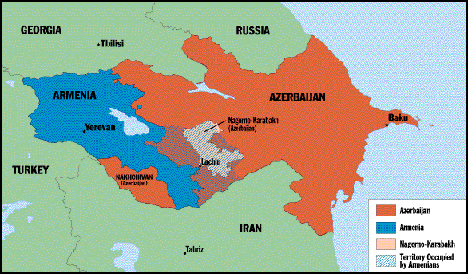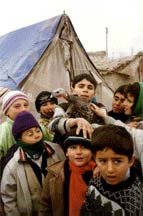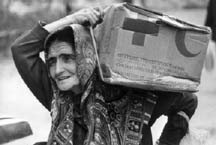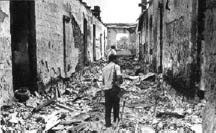|
Spring 1997 (5.1)
Vafa Guluzade, 57, graduated from Azerbaijan University in 1963 and received his doctorate from the Oriental Studies Institute of the Academy of Sciences in Moscow in 1967. He began his diplomatic career in 1969 as Attaché to the Ministry of Foreign Affairs in Moscow and later served as Second Secretary of the Soviet Embassy in Cairo and as Consular in Algeria. He speaks fluent Azeri, English, Arabic and Russian and has interpreted for Brezhnev, Kosygin, Gromyko and others. He has been deeply involved with the negotiations for the resolution of the Nagorno-Karabakh conflict. He has represented Azerbaijan in bilateral negotiations with Armenia and, since 1993, has led delegations to OSCE's Minsk Group meetings in Rome, Paris, Vienna, Prague, Geneva, Brussels, Ankara and Moscow.
Yes, admittedly, oil is politics. And we intend to do our best to use these politics as skillfully as we can. The rest is up to Armenia. If they take the initiative and act on it, the result will be in their favor. The transport of Azerbaijan's oil through Armenian territory could help Armenia become an economically viable nation and thus an independent country. Everyone needs to understand that the future of the world is through cooperation, not confrontation. The war between
Armenians and Azerbaijanis has been going on for eight years.
But still there is no peace despite the cease-fire agreement
that was signed in May 1994. Why has it taken the Minsk Conference1
such a long time to achieve a resolution of the Karabakh conflict?
Nearly four years have passed since they were commissioned by
the OSCE (Organization for Security and Co-operation in Europe)
to deal with this problem. What is your
assessment of the significance of the Lisbon Summit for Azerbaijan?  Secondly, it gives Nagorno-Karabakh legal status of the highest degree of self-rule within Azerbaijan. In other words, Armenians living in Azerbaijan would have autonomous rule but within the larger framework of Azerbaijan. Thirdly, it guarantees the security of Nagorno-Karabakh and its entire population. This means Armenians living there now could stay and Azerbaijanis who have been forced to flee these lands could return. Both groups would be protected. Azerbaijan agrees with these three principles, as do 53 of the 54 member states of the OSCE. Only Armenia refuses to acknowledge them.
For example, Armenians say no one must prejudge the status of Nagorno-Karabakh - that this is a decision that must be determined by the Minsk Group. Armenians are demanding independence of Nagorno-Karabakh, but we are convinced their ultimate goal is to annex Nagorno-Karabakh to Armenia. But the Minsk Group could never grant such rights to Armenia. That's why Armenians are so outraged by the Summit and why they're protesting so loudly. Lisbon thwarts Armenia's goal of annexing the territory of Azerbaijan. The Lisbon Summit confirmed that the world body supports the territorial integrity of Azerbaijan, meaning that Karabakh was, and still is, part of Azerbaijan. Azerbaijan and Armenia are both independent states since the collapse of the Soviet Union (1991). They each have independent international relationships. They each have internationally recognized territories and borders. That makes annexing Azerbaijan's territory in Karabakh an impossible dream for Armenia. They will have to withdraw their troops from our territories, and the sooner they do it, the sooner it will be to their advantage. But Armenian
leaders are expressing fears of persecution against their people
if they "give" Nagorno-Karabakh back to Azerbaijan.
In official circles, they are playing on that word "genocide"
again. And now, when Armenians claim that if Azerbaijan gets its territory back there could be genocide, the West ponders, "Yes, perhaps. Maybe you have a point there." You are the guilty ones. Armenians are making absurd statements, and the West pays attention. Armenians have stolen our land, slaughtered our people and now are saying that they are in danger of "genocide!" Again, they play the victim-a role they are so adept at. You shouldn't pay attention.
Why? Because many Armenians, especially the Diaspora, are obsessed
with this nationalist dream of establishing "the Great Armenian
State" by reclaiming a wide stretch of territory that they
insist belonged to them nearly 2,000 years ago. All the while,
nobody stands up and accuses Armenia of its aggressiveness. Why
aren't you going to the headquarters of Dashnak in Lebanon, making
photocopies of their expansionist maps and announcing to the
world on CNN that Armenians are the real aggressors? You're not
doing it!
Left: Azerbaijan woman receiving humanitarian
assistance from the International Federation of Red Cross and
Red Crescent (IFRCRC). Both photos: Oleg Litvin (1993). I remember back in the Soviet period whenever one single Jew was persecuted in the Soviet Union, the West stood up and screamed that an individual's human rights had been violated. But today, 1 million Azerbaijanis are living as refugees-hundreds of thousands of them in inhumane conditions in camps, schools and derelict buildings-and the West remains silent. The world treats Armenia very politely and speaks about its "democracy-building" activities. But there is no democracy in Armenia. It is an aggressive, expansionist state. But everyone speaks as if it were a normal state with which they should build normal relations. Armenia was only able to occupy Nagorno-Karabakh eight years ago because of the support of the Soviet Union. Then in 1989, the Armenian Parliament voted to recognize Nagorno-Karabakh as a part of Armenian territory. In 1990, they passed another resolution not to sign any document with Azerbaijan which identified Nagorno-Karabakh as part of Azerbaijan. When that Soviet government collapsed in 1991, Russia continued to support Armenia. Of course, Armenia always puts forth the pretense that Nagorno-Karabakh is a party to the conflict and that they, themselves, have not been involved and that the conflict concerns one group of ethnic Armenians living in Azerbaijan who want their independence. But tell me, how can 100,000 Armenians isolated in the Caucasus mountains with no access to industry or weapons-with nothing in their hands-how can they defeat 7 million Azerbaijanis militarily? That's why I am accusing Western democracy of being weak and unjust. If Azerbaijan had occupied a mere centimeter of Armenian territory, can you imagine the clamor that would have been heard all over the world? But Armenians are killing us, they've occupied 20 percent of our territory, they've displaced 1 million of our people-one-seventh of our population-and everybody is saying, "Poor Armenians, there could be genocide against them from the Azerbaijani side!" Armenians are masters of manipulation and speculation. The West is to blame because it has not identified Armenia as the aggressor that it is. Even the United Nations' documents refer to "ethnic Armenians"-an absurd explanation. Armenia still wants to continue their occupation of the Lachin region on our western border in order to connect Karabakh through this corridor to Armenia. They want to retain their troops there. But the West should explain to Armenia that Azerbaijan is responsible for peace in its own territories, and the international community will be the guarantor. Azerbaijan's President has declared on many occasions that Azerbaijan is ready to give Armenians in Nagorno-Karabakh the highest degree of autonomy. That, in itself, is a tremendous concession. When Armenia first began occupying Azerbaijan, the image of Azerbaijan held by the world community was very negative. Armenia succeeded in propagating the idea that they were the only "island of democracy" surrounded by a world of darkness and aggression. Azerbaijan was portrayed as part of this encompassing evil. We were perceived as a conservative, fundamentalist Muslim state which could not even establish stability in our own territory. Therefore, the world didn't blame Armenia for claiming Azerbaijan's territory. In my opinion, our greatest achievement these past three years has been to change this image. Now the world knows who we are and who Armenia is. Even now, Armenians retain strong support which makes it difficult for us to convey the truth about this conflict. But slowly, we are overcoming these difficulties. Our integration into the world community and our success in establishing strong relationships with the West show that we are gaining political victory over Armenia. Just recently, I received a document from Washington expressing the opinion of The Center for Security Policy. The Center criticizes the lack of U.S. support for Azerbaijan, saying that it has not been sufficient. Although the Clinton Administration has been supporting the policy of Aliyev, its efforts have been very timid. But you see, the political circles of the U.S. are beginning to realize that Azerbaijan should be given greater support and attention. It is not only because Azerbaijan has oil and other resources. It is because Azerbaijan's principles overlap with those of the U.S. Therefore, Azerbaijan deserves greater support from the West. And I'm convinced this support will come. What kind
of support are you expecting? However, it's interesting that one of the top Armenian officials recently stated, "Azerbaijan should offer the Karabakh Armenians such conditions that they would agree to be within the state of Azerbaijan." Such a statement indicates that Armenia is beginning to realize that Nagorno-Karabakh will remain part of Azerbaijan. You were
involved with Palestine-Israeli negotiations back in the 1970s.
What experience did you gain that you have brought to the negotiating
table today in regard to the conflict between Azerbaijan and
Armenia? But in the case of Azerbaijan and Armenia, Armenians have their own homeland, and the international community has recognized the sovereignty of Azerbaijan over its own territory. I think the conflict between Azerbaijan and Armenia is much simpler than the Arab-Israeli situation. But there is no logical rationale for the world to support the Armenians. If Armenians dislike living in Azerbaijan, let them go and live in Armenia. So, you see, the dimensions of these two conflicts are entirely different. When do you
believe the Karabakh conflict will be resolved? They don't need to set up a corridor between Karabakh and Armenia through that tiny 5-kilometer stretch of Azerbaijan's territory, sometimes referred to as the Lachin Corridor. All roads connecting Karabakh to Armenia will be accessible. The international presence during the initial period could assure them of this linkage. But, again, under the pretext of a corridor, Armenians are trying to join Karabakh to Armenia through this Lachin strip. These goals are not achievable, and it is becoming obvious to the Armenians now. That's why I believe that peace is finally attainable. I hope peace will come this year. Today, Azerbaijan has a very
successful foreign policy, and we are beginning to integrate
into the world economy. In the past, we were not able to have
our own international relationships. Now these relationships
are increasing every day. In spite of the military occupation
of 20 percent of our land, Azerbaijan is becoming one of the
most progressive, most independent states. As soon as we liberate
our territories, Azerbaijan will become one of the most flourishing
states in the East. And in the process, you will see, Armenia
will benefit as well. From Azerbaijan International (5.1) Spring 1997. Back to Index
AI 5.1 (Spring 1997) |




